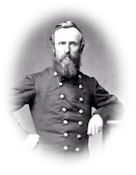Flat Top Mountain, June 3, 1862.
Dearest : — I am made happy by your letter of the 24th and the picture of Webb. Enclosed I send Webb a letter from Lieutenant Kennedy.
I am not surprised that you have been some puzzled to make out our movements and position from the confused accounts you see in the papers. Our log-book would run about this way: Flat Top Mountain, twenty miles south of Raleigh, is the boundary line between America and Dixie — between western Virginia, either loyal or subdued, and western Virginia, rebellious and unconquered. [Here follows an account of the movements and activities of the regiment during May, which is a repetition in brief of previous letters and Diary entries.] Here we are safe as a bug in a rug — the enemy more afraid of us than we are of them — and some of us do fear them quite enough. My opinion was, we ought to have fought Marshall at Princeton, but it is not quite certain.
All our regiments have behaved reasonably well except [the] Thirty-fourth, Piatt’s Zouaves, and Paxton’s Cavalry. Don’t abuse them, but they were pretty shabby. The zouaves were scattered seventy miles, reporting us all cut to pieces, etc., etc. Enough of war.
The misfortune of our situation is, we have not half force enough for our work. If we go forward the enemy can come in behind us and destroy valuable stores, cut off our supplies, and cut through to the Ohio River, — for we are not strong enough to leave a guard behind us.
We look with the greatest interest to the great armies. Banks’ big scare will do good. It helps us to about fifty thousand new men.
I nearly forgot to tell you how we were all struck by lightning on Saturday. We had a severe thunder-storm while at supper. We were outside of the tent discussing lightning — the rapidity of sound, etc., etc., Avery and Dr. McCurdy both facing me, Dr. Joe about a rod off, when there came a flash and shock and roar. The sentinel near us staggered but did not fall. Dr. McCurdy and Avery both felt a pricking sensation on the forehead. I felt as if a stone had hit me in the head. Captain Drake’s arm was benumbed for a few minutes. My horse was nearly knocked down. Some horses were knocked down. Five trees near by were hit, and perhaps one hundred men more or less shocked, but strange to say “nobody hurt.”
All things still look well for a favorable conclusion to the war. I do not expect to see it ended so speedily as many suppose, but patience will carry us through.
I thought of you before I got up this morning, saying to myself, “Darling Lucy, I love you so much,” and so I do.
Affectionately,
R.
Mrs. Hayes.



